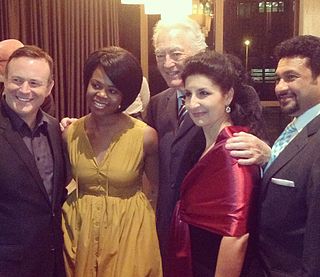A Quote by Karen DeCrow
As any opera fan knows, lawyers and judges do not fare well in most operas. Just consider the productions of 'Andrea Chenier,' 'Aida, Norma,' 'Billy Budd,' 'Peter Grimes,' 'The Crucible,' 'Lost in the Stars,' 'The Marriage of Figaro,' 'The Makropulos Case' and Wagner's 'Ring' cycle. Around 1810, the theme of justice emerged in opera.
Related Quotes
First, my frame of reference for the Britten opera shifted. I'd always thought of Britten's approach in Death in Venice as another exploration of the plight of the individual whose aspirations are at odds with those of the surrounding community: his last opera returning to the themes of Peter Grimes. As I read and listened and thought, however, Billy Budd came to seem a more appropriate foil for Death in Venice.
Opera was an enormous part of my childhood. My parents were both opera buffs, and they met in the box seat of an opera performance. And I also was a boy soprano, so before puberty hit, I was onstage playing a wide variety of orphans and urchins in all sorts of operas, and the sheer melodrama of their stories was just always appealing to me.
Ask any Mexican, any Puerto Rican, any black man, any poor person - ask the wretched how they fare in the halls of justice, and then you will know, not whether or not the country is just, but whether or not it has any love for justice, or any concept of it. It is certain, in any case, that ignorance, allied with power, is the most ferocious enemy justice can have.
I've always loved opera; it never occurred to me that I would write a proper libretto. One of my closest friends is a composer, Paul Moravec, and a few years ago, Paul and I were at lunch, and I said to him, "you really have to write an opera." So, he says very casually to me, "I'll do it if you write the libretto." Well, little did I know that the within a couple of years we would end up getting a commission from the Santa Fe Opera to write an opera together, "The Letter," which turned out to be the most successful commissioned opera in the history of the Santa Fe Opera.
Sometime during the 1990s, when I was teaching philosophy at UCSD, my friend, colleague, and music teacher, Carol Plantamura, discussed the possibility of teaching a course together looking at ways in which various literary works (plays, stories, novels) had been treated as operas, and how different themes emerged in the opera and in its original. One of the pairings we planned to use was Mann's great novella and Britten's opera. Unfortunately, the course was never taught, but the idea remained with me.



































